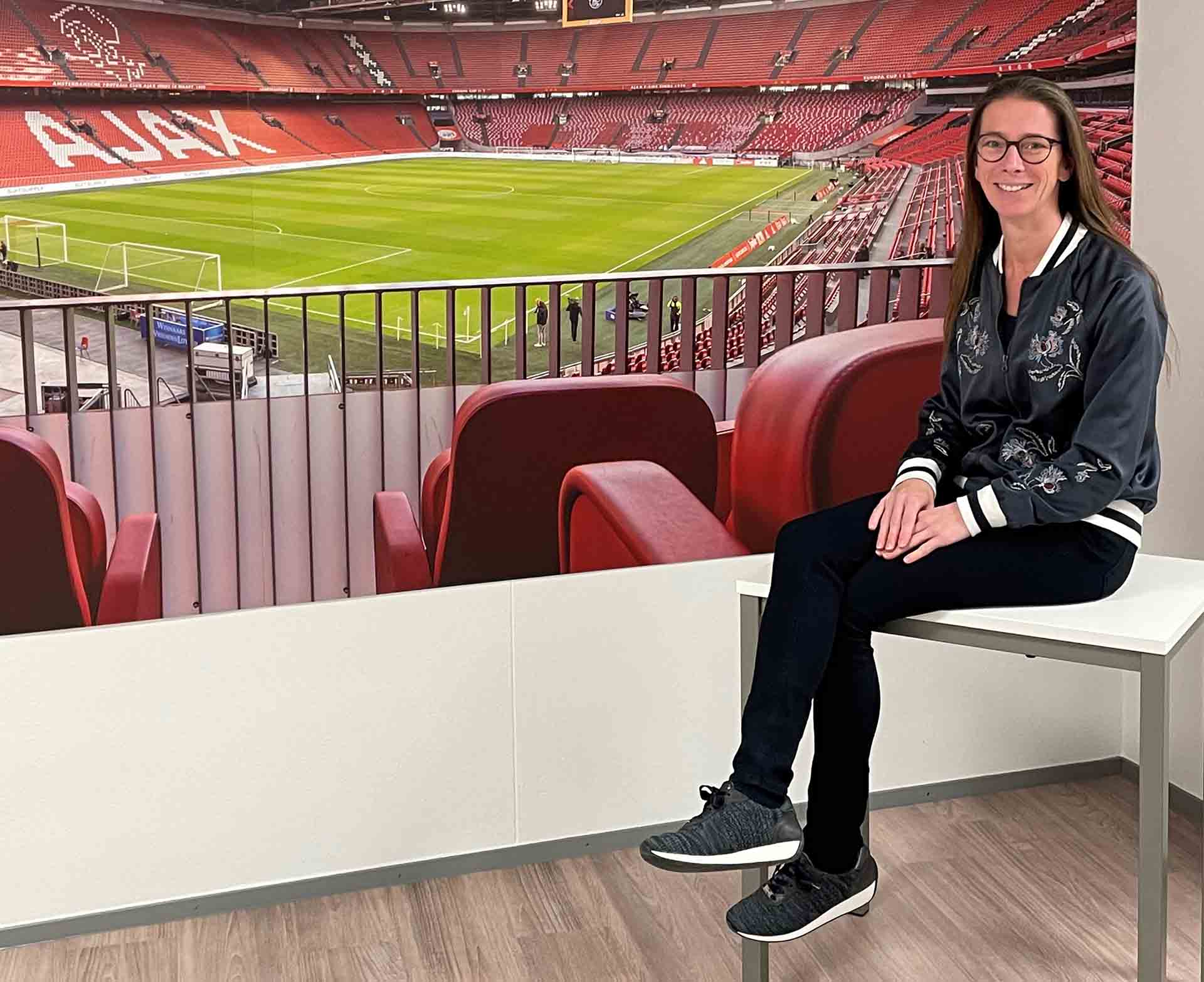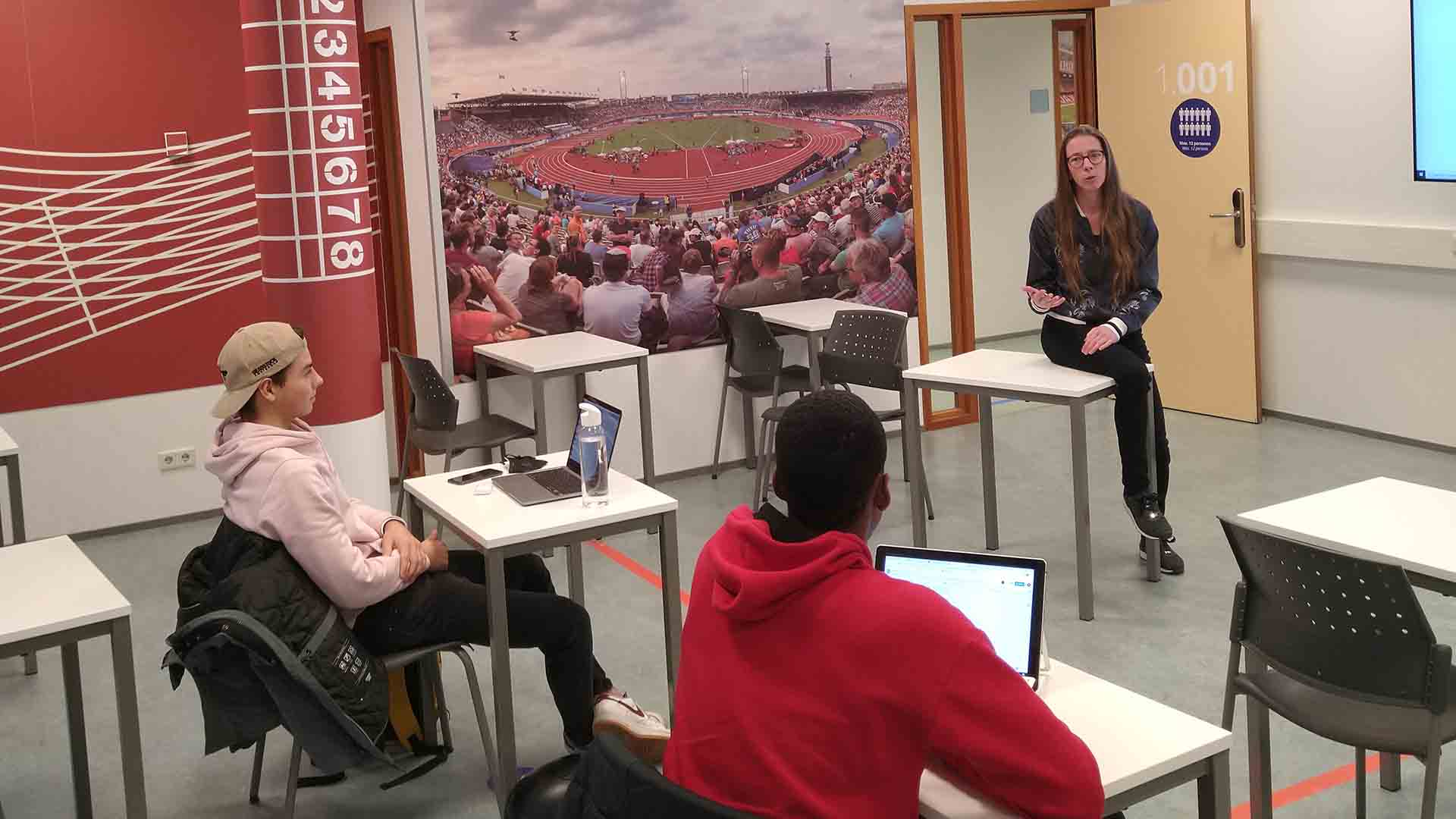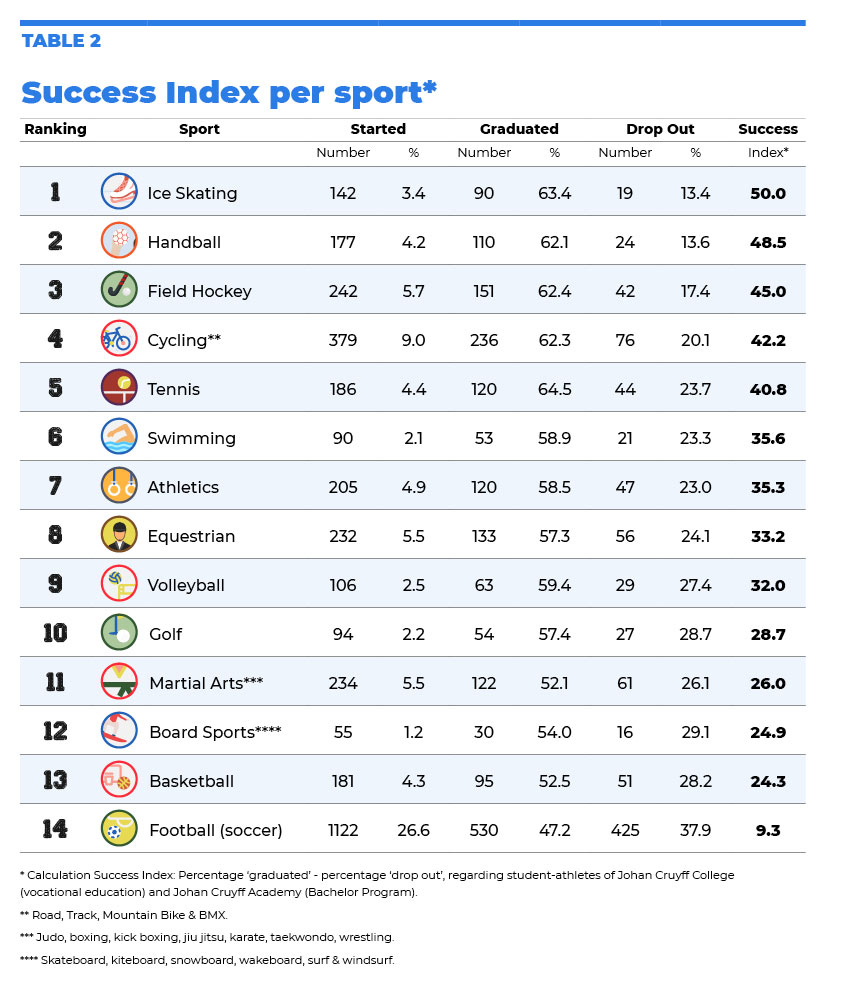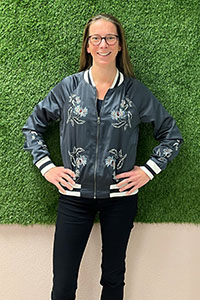
Professor and coach Joyce van Kooten, who is responsible for the admission and academic training of student-athletes at Johan Cruyff Academy, explains the different approaches to study coaching of elite athletes depending on the athlete and the sport he or she plays
Diversity is a very important factor to take into account in the study coaching of elite athletes. The differences that exist between male and female athletes, between young talents and more mature athletes, in the guidance of disabled athletes, and in the processes to be followed depending on the different stages of a sports career is the subject of this interview with Joyce van Kooten, who is responsible for the admission and academic training of student-athletes at Johan Cruyff Academy.
Since 2007, Joyce has been involved as a teacher and a study advisor in developing the study coaching program for elite athletes at Johan Cruyff Academy Amsterdam. Together with the rest of the team, she strives for the ideal balance between students’ sport and their full-time bachelor’s program in sport marketing.
After analyzing the principles of study coaching of elite athletes in Part I of Joyce’s interview, we now turn to the diversity factor. Later, in a final and third part, we will devote a separate chapter to top-level athletes.
Women versus men
“Female student-athletes reported stronger academic identities (Sturm, Feltz, & Gilson, 2011), greater motivation towards academics (Lupo et al., 2017b; Tekavc, Wylleman, & Erpič, 2015), and greater prioritization of academic pursuits (Fuches et al., 2016) compared to their male counterparts. This gender difference was proposed to reflect greater opportunities for an ongoing professional career in sports for men, compared with women, hence women may be more motivated to explore non-sporting identities (Fuches et al., 2016; Sturm et al., 2011). [Source]”
Are female athletes more successful in studies than their male counterparts?
Yes, in general they are. It may be explained from the differences in salaries. In my experience, there is not much difference among young sports talents. They are still discovering whether they have a chance to make it in their sport. Usually, their sport does not provide them with an income yet.
But in some sports, such as field hockey, cycling and football, there is a large salary inequality between men and women at the higher sports level. It is more common for the women to be realistic and know that they will not be able to earn a living from their sport.
And particularly among football players, especially at a younger age, the idea prevails among boys—and this is precisely what Johan Cruyff wanted to change—that studying will not be so necessary if they ‘make it’ in football.
“Johan Cruyff wanted to change the idea, —specially among football players— that studying will not be so necessary if they ‘make it’ in football.”
In all other sports, there is often the realization—and a supportive culture—that studying is important for self-development and a good job. On the other hand, a job is still perceived by many student-athletes as something far away in time, and it does not always immediately provide the trigger to start studying an academic program in a motivated and disciplined manner.
Brain research also shows that girls often develop the necessary ‘executive functions’ a little earlier. So they seem to be just a little ahead, which may also benefit their study progress. But that certainly does not apply to all, so it is better to be very careful about this.
“Almost all elite athletes are perfectionists and want to be the best at what they do.”
We also notice that girls often want to do ‘well’ in their studies. Fear of failure and perfectionism also seem to occur a bit more often in young women, but… almost all elite athletes are perfectionists and want to be the best at what they do. Once in a while we do have a cum laude student, which I have noticed are often women.
Usually, we have slightly more men than women in the groups at the Johan Cruyff Academy. On the other hand, we do have more female students in the same study program for non-top athletes. In the first years of study, we notice that women are on average a bit better at planning.

What do these differences mean for study coaching?
That you should not blindly accept these generalizations! There can be all kinds of reasons why a student-athlete is more or less serious about their studies. We now have a student who has struggled for years with organizing his study plan and communicating with us about that. I was almost convinced that it was part of his personality, but now that he has retired from top sport, he is an exemplary student in planning and communication.
What I also mean to say is students don’t always show what they have to offer as long as they are still practicing high-level sport. Our aim as an academic team, is that they eventually get the diploma, not necessarily with great grades. Sometimes, for the sake of self-preservation, you even have to get them to lower the goals they set themselves in their studies and coach them that ‘good is good enough’.
“Students don’t always show what they have to offer as long as they are still practicing high-level sport.”
Obviously, it is a bit frustrating for a study coach, when you see that the grades are somewhat lower than a student—in your opinion—is capable of, but you also have to be realistic. In addition to an almost full-time sports week, you cannot always expect that the student also continuously achieves high marks in all aspects of a full-time higher professional education program.
This means that, as a study coach, you must above all stimulate them, that they themselves get started with their planning, and that we as coaches can better accept the—sometimes large—differences in study level. Ultimately, they have to realize the importance of their studies and develop a working method that works for them. Once a truly intrinsic motivation for the study is present or emerged, the student-athletes will also do their best to make it a success.
“As a study coach, you must above all stimulate them, that they themselves get started with their planning.”

Joyce van Kooten in the Johan Cruyff Arena room of the Johan Cruyff Academy in Amsterdam.
Athletes with shorter careers
“While female athletes were found to retire earlier than male athletes, and disabled athletes earlier than their able-bodied counterparts (North & Lavallee, 2004), sport-specific differences showed gymnasts to discontinue their sport career around 24 years of age, swimmers at the age of 29 years, and sailors even at +40 years of age. [Source]”
What is your experience in counseling disabled student-athletes?
We sometimes joke with them that they have a ‘double handicap’ to study: a disability and top sport. I recently talked to our alumna Jiske Griffioen about the fact that Covid-19 has opened up many more online possibilities, which probably would have helped her to combine study with sport in the past.
For disabled student-athletes, we can use the extensive resources available at the university of applied sciences that the Johan Cruyff Academy is part of. This also applies to refugees, for example. The trick is often to help them find the right ways, not to want to do everything themselves. The student sometimes experiences this as pressure to ‘have to go’ to the various departments for help. That is sometimes difficult for them. You can offer all sorts of things, but it is the student-athlete who ultimately has to make use of it.
“The trick is often to help them find the right ways, not to want to do everything themselves.”
So, you have to be well aware of all the possibilities and think outside the box, but we are used to doing that at the Johan Cruyff Academy anyway. I am therefore convinced that we, as the Johan Cruyff Academy team, can also switch quickly with these groups of athletes, to find creative solutions to balance sport and studies.
And gymnasts? Is study coaching different when you know beforehand that their sports career will be over at a very young age?
The experiences I have had with gymnasts were not so much age-related, but mainly had to do with the consequences of the culture and the approach in gymnastics, such as anorexia and not daring to stand up for themselves.
I therefore want to be careful with age-related statements, but what might be true is that if they finish their sports career at an earlier age, they still have plenty of opportunities to go to a university. That would mean that they have more choice in what studies they want to do. They also know earlier whether they are going to reach the top in their sport, so in that sense they also have a freer choice of studies, if it turns out that they have passed their peak.
“If they finish their sports career at an earlier age, they still have plenty of opportunities to go to a university. That would mean that they have more choice in what studies they want to do.”
At the very highest levels of gymnastics, personally it seems to me too difficult to do full-time studies in addition to sport. I had that experience at least once with an Olympic gymnast, who took up her studies again in the final phase of her sports career.
In a general sense, there is a distinction in the approach based on age. I have different conversations with the somewhat older students who have had a gap year or had experience abroad, than with the young talents who have just graduated from general secondary education (HAVO, in the Netherlands). This is linked to the Wylleman model and the phases they are in, which we discussed earlier (Part 1).

Does your study coaching change when athletes come to the end of their sports career?
The degree of extra facilities we offer athletes to enable them to study in addition to their sport depends on the intensity of the sport. This is not necessarily related to the phase the athlete is in.
A more intensive sports program requires more customization. Every year, we adjust to what extent the athlete practices high-level sport, and therefore which adjustments are actually needed. That is never the same within each sport, but always tailor-made for each athlete.
“The degree of extra facilities we offer athletes to enable them to study in addition to their sport depends on the intensity of the sport, is not necessarily related to the phase the athlete is in.”
Students who are at the end phase of their sports career generally understand the importance of their studies and the diploma. Generally, they are somewhat more motivated to study, because of their life experience and what they have learned through their sport career, which often allows them to better estimate what they can or want to do with their studies.
In terms of content, you then become more of a sparring partner and, as a study coach, you usually talk more about the future after sport: where does the athlete want their career to go? and what is still needed in terms of knowledge and skills?
With young athletes, you notice that the need to study is often imposed from the outside and is in any case a much more abstract concept (“it seems to be a good thing”). They usually do not yet have a clear idea of what they can do with it and often do not know at all in which direction they would like their career to go.
Emphasizing the long-term benefit usually does not work with them. It is more important to guide them in the ‘here and now’ and simply help them to keep all their options open.
In our supervision, we also continuously make the parallels between what they experience in their sport and the content of the study program and the skills that we ask of them, so that their studies also become more recognizable for them and they increasingly see what they can benefit from through their studies.

Joyce van Kooten, in conversation with two students.
Stereotyping footballers and study
Footballers are only interested in football, and not in studying. They are spoiled with high expectations of sky-high earnings and immense popularity, often nurtured by their social environment, peers and parents. As a result, their study success rate is low and there are many dropouts.
What are your experiences with football players and what does that mean for the study coaching approach?
Unfortunately, it is often the case that especially the young footballers, who have just finished secondary education and are playing in the A1 or youth team, often do not make it in a bachelor’s program. I think there are several reasons for this.
They are often very young and tend to give in to pressure from the environment more quickly than make their own choices. The support of peers is also often less in football than in most other sports; studying is still not commonplace in the football world. When you study as a football player, you are a bit ‘different’, and you do not really belong to the group. A footballer must then be prepared to stand firm, to still want to study.
“Studying is still not commonplace in the football world. Football players must be prepared to stand firm, to still want to study.”
The trainer/coaches in football often do not take studies into account—or at least much less than in other sports—and often not at all after their players have obtained their basic qualifications. Nevertheless, sometimes there is more student counseling than in other sports, but the coordination between that department and the trainer/coaches often seems to be insufficient.
I also have the impression that they sometimes have very little control over their own lives. That also happens in other sports, but it seems stronger in football. So much is organized that it becomes difficult for them to fill in things for themselves. If you are required for all kinds of activities all week from 9:00 am to 4:00 pm, it will be very difficult to find space or energy to study sport marketing at the Johan Cruyff Academy.
“So much is organized to football players that it becomes difficult for them to fill in things for themselves. If you are required for all kinds of activities all week it will be very difficult to find space or energy to study.”
This year we had four football players from one club, who all quit studying one after the other within five weeks. This was partly due to the coronavirus, but they also indicated that their sports schedule was so full that they could not study. That was of course very disappointing and difficult to accept.
I had a good chat with the club’s youth academy. They were shocked that the boys had indicated to us that they really couldn’t do anything else on the side, while the club itself was of the opinion that it should be possible to study along with their other activities. We have not been able to prevent these boys dropping out, but I do hope that we now have a relationship in which mutual consultation will be more feasible in the future.
Another remarkable detail I sometimes notice is that with the football players who did well in their studies, I did not speak to any of the parents, while in the cases where it ultimately did not work out, ‘strongly involved’ parents also exerted pressure on their kids to do well. They do it out of concern and it is meant well, of course, but the same question in the end always remains: what does the athlete really want?
“It is possible! If the football player himself really wants to study, he clearly indicates this to the club and also tries to organize his life in such a way that the combination becomes possible.”
Because it is possible! We now have, for example, a football player who passed the propaedeutic phase in one year and another student who is playing football in the Dutch premier league, the Eredivisie, who passed all but one subject. The success factors are: the football player himself really wants to study, he clearly indicates this to the club and also tries to organize his life in such a way that the combination becomes possible.

What is your opinion on the table showing study success per sport?
The table confirms what we just talked about: the chance that footballers will get their diploma is unfortunately low. Perhaps it would be nice to compare the male players with female players. I expect there is a difference there. I want to be careful with further interpretation, because the numbers are not large, but I think the table does offer interesting material for discussion.
“We can conclude that in general there is still a lot to be gained, because the success index is quite low in most sports.”
We can conclude that in general there is still a lot to be gained, because the success index is quite low in most sports. We have to take into account that the dropout rate is greatest in the first year of study, and that on average and nationwide about a third of students abandon their studies in the first year in all bachelor programs in The Netherlands. We try to help them make the best possible choices through information and in the intake interviews, but it is still very difficult for them to make a good study choice.
I think that all of us, in the sports and education sectors together, could continue to work on a culture and an approach that facilitates the combination of sport and study even better. In general, where studying is seen as ‘normal’ in addition to being an athlete, it is also easier for the student-athlete to engage in a conversation with their sport trainers and coaches, to make time for study.
“The sports and education sectors could continue to work on a culture and an approach that facilitates the combination of sport and study even better.”
These figures can be directly linked to a certain extent, though not entirely, to some sports that do not have a study culture, because it also depends – for example – on the extent to which individual trainers/coaches are study minded towards the athlete.
Perhaps we could also share best practices more with each other and exchange more information — sports and education together. For example, I don’t find it very surprising that ice skaters do relatively well. The Dutch skating world is very study-minded, and it is during their competition season — which falls in the middle of the academic year —when they have the space between matches to combine their sport with study.
Regarding your experiences, what are other ‘difficult sports’ for study coaching?
In some sports, such as swimming, cycling and equestrian sports, a lot of hours have to be dedicated to the sport. These are also individual sports, where they often have no extra facilities or support from the sport context, which means that they have to arrange everything themselves even more.
Athletes from sports that are very fickle, such as sailing or winter sports, are quite often absent at times that cannot be planned well in advance. This can make them very time-consuming athletes for us in terms of study counseling. However, they are usually better at organizing their sport program, and can plan their sport training and competition around important study moments.
And, in general, many student-athletes often have ancillary activities that give them an income.
What I really would like to emphasize here, is that we do not make our study counseling any different. Then you only stigmatize. And what I have learned from all those different challenges per sport is that you have to stay very alert to the possible support that an athlete can receive from the sport, and be well aware of all the options that education has to offer, such as a course with a staggered propaedeutic phase, spread over two years instead of one.
And – finally – I would like to add here that unfortunately I cannot further substantiate my experiences with hard figures, as to what extent different aspects of sports affect the study success at the Johan Cruyff Academy. It would be a good idea to turn this into a research assignment.

Should education seek more consultation with sports coaches and clubs for optimal guidance of athletes?
This is an interesting theme: to what extent do you coordinate with sports organizations? We are guiding bachelor’s degree students, who we would like to lead and manage their own lives. The starting point is that we should not arrange everything for them, but we should facilitate certain things.
“I do notice that sometimes the athlete is afraid that talking about their studies with their trainer/coach may affect their position in the sports team.”
I do notice that sometimes the athlete is afraid to discuss study time with the trainer/coach, because they are afraid that talking about their studies may affect their position in the sports team.
“A good consultation between all parties actually improves all performances—of the athlete, the club or team, and of the coach and the academic program.”
Earlier this academic year, I had a good conversation with an Olympic swimmer and his direct trainer/coach, during which all three parties presented their vision and jointly explored the possibilities for sport and study very openly. It was also a support for the athlete, because we indicated through this conversation that we support him, instead of the athlete always feeling that he is torn between his sport and his studies.
Such an experience then shows that good consultation between all parties actually improves all performances—of the athlete, the club or team, and of the coach and the academic program.

Joyce van Kooten.
Joyce van Kooten is a study advisor and teacher at the Johan Cruyff Academy in Amsterdam, part of the Amsterdam University of Applied Sciences. As a study advisor, she is responsible for the intake and study progress of students. In doing so, she and her colleagues strive for an ideal sport and study combination for every student-athlete. She is also a teacher in Personal Branding and Communication Skills, where student-athletes gain insight into their personal and professional development.
Joyce was a consultant in ‘recruitment and selection’ and ‘management development’ in the business sector for KPN and TNO. Through her company Joynyou, she works as a personal coach for the Master in Coaching of the Johan Cruyff Institute in Amsterdam, she helps in sharing education between the three Johan Cruyff Academies, and she is a teacher in the English editions of the online modules ‘Leadership‘ and ‘People Management in Sport‘ offered by the Johan Cruyff Institute in Barcelona. Her ambition is to contribute (even more) with her own company to projects in the field of personal development and self-regulation of young athletes.






